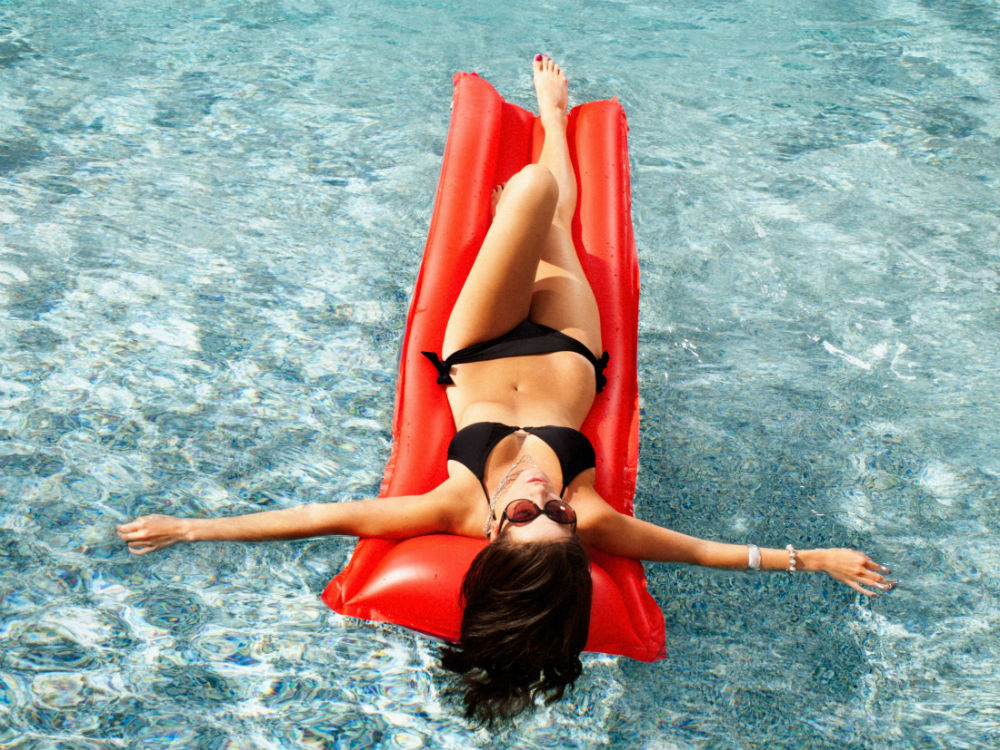
Celebrity news, beauty, fashion advice, and fascinating features, delivered straight to your inbox!
You are now subscribed
Your newsletter sign-up was successful
Is drinkable sunscreen a genius invention - or an unsafe fad that's not be trusted? Here, both sides weigh in...
As the weather heats up, it's time to start thinking about sun protection – namely, what the best sun cream on the shelves is. And it seems this season, everyone is buzzing about a curious new product on the market that's being dubbed as the very first 'drinkable sunscreen.'
Harmonized H2O is a form of bottled water that's branded as a 'UV Neutralizer.' The product was developed in the U.S. by Dr Ben Johnson and promises a UV defense comparable to an SPF 30 sun cream.
We have to admit: The thought of just downing a bottle of water before hitting the beach and being able to forget about sun cream is pretty appealing. Goodbye, weird tan lines. So long, sunburns in the those tricky places you missed with the cream. See you later, awkwardly asking your mates to do your back...
Well, If you think it sounds too good to be true, you're not alone. Since news of the product made the rounds, it's received loads of backlash from sceptics. To get the true story, we consulted two top skincare experts, as well as the creator himself - and, unsurprisingly, they paint two very different pictures.
The description for Harmonized H2O - which has not been tested or approved by any regulatory bodies - reads as follows: 'This is simply purified water imprinted with unique vibrational waves which isolate out the precise frequencies needed to protect you from UV rays.'
We asked Dr Adam Friedmann, a leading dermatologist at The Harley Street Dermatology Clinic, to weigh in on the possibility of such an invention. 'Potentially a consumable product might be formulated, but I suspect it would only protect from UV penetration by causing increased melanin production,' he says.
Celebrity news, beauty, fashion advice, and fascinating features, delivered straight to your inbox!
Our second medical expert, however, wasn't quite as diplomatic. We asked Dr Kat Arney, Cancer Research UK’s science information manager, if she thought the claims were legit. 'Absolutely not. It’s just water,' she says. 'There is no scientifically credible mechanism by which water can be “imprinted” with protective “frequencies.” It promises protection from UV rays, but it hasn't been evaluated by the FDA.'
But Dr Johnson isn't the least bit phased by his peers' reactions. 'I expected a lot of criticism,' he says. 'Anything groundbreaking, especially with this cutting-edge science, is going to get a lot of resistance. People are passionate about sun protection, as am I, and once they get past the "this can't be possible" phase, hopefully they will experience it for themselves. People who are against this have not tried it. I believe that the consumers will speak loudest in the end because this is a revolutionary product.'
He goes on to say that not only does his drinkable sunscreen work, but he actually thinks it's superior to traditional sun creams. 'It does work similarly to topical sunscreens in that it provides a similar level of protection,' he says. 'Otherwise, this is much better. There is no topical application. There are no side effects. It provides protection on all aspects of the body, including eyes and scalp.'
But Dr Karney is not convinced - and she's eager to reiterate her view that Dr Johnson's product is no more effective than drinking the stuff that comes out of your tap. 'The risk is that people will go out in the sun thinking they’re protected and risk burning. This is because it’s just water,' she says. 'It hasn’t been formally tested in any way. Testimonials are absolutely no substitute for proper studies. Also, it’s just water.'
Dr Friedmann agrees that the product's lack of FDA approval is worrying and does not believe it should be treated as a scientific breakthrough. 'Without evidence or scientific backup, this sounds like completely unsubstantiated nonsense in the realms of homeopathy rather than true science,' he says. 'Without scientific randomised placebo-controlled trials, there is every chance that this product will be as ineffective at UV-protection as drinking apple juice.'
But the fact that Harmonized H2O is not FDA-approved is not a concern for Dr Johnson. 'This product is FDA exempt because we are not making SPF claims and we are not affecting the human body,' he says. 'The cancellation waves that are contained in the water vibrate at your skin level so the UVA/UVB cancellation actually happens above the skin.'
Clearly the opposing sides of this argument aren't likely to reach an agreement any time soon. But with the incidences of skin cancer skyrocketing in the U.K., Dr Karney and Dr Friedmann both say that it's best to stick with what's proven to work. They advise choosing a topical sunscreen with high SPF and a high UVA protection factor to make sure you're safe.
'It’s important to always take a critical look at any health claims made about untested, unapproved products,' says Dr Arney. 'If the manufacturer can’t provide solid scientific evidence that a product actually works, it’s best to avoid it. At best, you’ll be wasting your money. At worst, it could be harmful.'